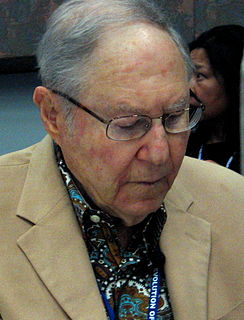A Quote by Jack Steinberger
I feel I learned as much from fellow students as from the professors.
Quote Topics
Related Quotes
And then there is Pythagoras. The legend is that the founder of theoretical mathematics was so outraged when one of his students, the haplessly gifted Hippasus, discovered irrational numbers that he sent the poor fellow out on a raft to drown, initiating a venerable tradition of professors mistreating their graduate students.
In some of the classes, especially the introductory religion courses I took, the professors can veer into a particular strain of religious anti-intellectualism. Professors typically aren't given tenure at Liberty, so there's pressure to hew to the party line on religious and social issues. I didn't see a whole lot of my professors encouraging critical thinking among their students. Which isn't to say that students don't engage critical thinking skills at Liberty - just that it wasn't part of my classroom experience there.
Some conservatives have expressed outrage that the views of professors are at odds with the views of students, as if ideas were entitled to be represented in proportion to their popularity and students were entitled to professors who share their political or social values. One of the more important functions of college that it exposes young people to ideas and arguments they have not encountered at home is redefined as a problem.
The experience I had all those 40 years of working on Broadway and working on television, I bring it to students and I let them kind of drain me dry but they all feel at the end of the class that they are getting so much out of it. The students grow in my classroom because they feel safe. They don't feel like they're going to be yelled at.
The possibility that stock value in aggregate can become irrationally high is contrary to the hard-form "efficient market" theory that many of you once learned as gospel from your mistaken professors of yore. Your mistaken professors were too much influenced by "rational man" models of human behavior from economics and too little by "foolish man" models from psychology and real-world experience.
To say that you have taught when students haven't learned is to say you have sold when no one has bought. But how can you know that students have learned without spending hours correcting tests and papers? . . . check students understanding while you are teaching (not at 10 o'clock at night when you're correcting papers) so you don't move on with unlearned material that can accumulate like a snowball and eventually engulf the student in confusion and despair.




































